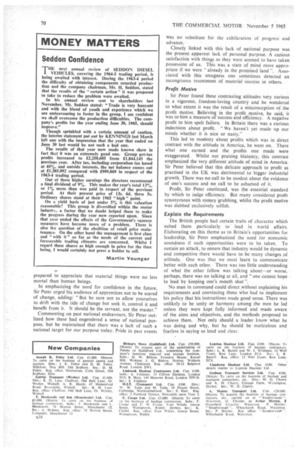MONEY MATTERS
Page 72

If you've noticed an error in this article please click here to report it so we can fix it.
Seddon Confidence
THE next annual review of SEDDON DIESEL VEHICLES, covering the 1964-5 trading period, is being awaited with interest. During the 1963-4 period the difficulty of obtaining components retarded production and the company chairman, Mr. H. Seddon, stated that the results of the certain action" it was proposed to take to reduce the problem were awaited.
In his annual review sent to shareholders last November, Mr. Seddon stated: "Trade is very buoyant and with the blend of youth and experience which we are endeavouring to foster in the group, I am confident we shAll overcome the production difficulties. The company's profits for the year ending June 30, 1965, should improve."
Though sprinkled with a certain amount of caution, the interim statement put out by KENNINGS last March left one with the impression that the year that ended on June 30 last would be not such a bad one.
The results of that year now made known show in fact that it was an extremely good one. Group pre-tax profits increased to £2,250,605 from £1,844,145 the previous year. After tax, including corporation tax based at 40%, and outside interests, the net balance comes out at £1,385,092 compared with £909,869 in respect of the 1963-4 trading period.
Out of these higher earnings the directors recommend a final dividend of 9%. This makes the year's total 13%, or 1% more than was paid in respect of the previous period. At their present price of 13s. 6d. these 5s. Ordinary shares stand at their 1965 " high " point.
On a yield basis of just under 5% is this valuation reasonable? This group is diversified within the motor industr,, a factor that no doubt helped them to make the progress during the year now reported upon. Since that year ended the effects of the Government's squeeze measures have become more of a problem. There is also the question of the abolition of retail price maintenance. On the other hand the management is first class and "with it" so far as the needs of the current and foreseeable trading climates are concerned. Whilst I regard these shares as high enough in price for the time being, I would certainly not press a holder to sell.
Martin Younger




















































































































